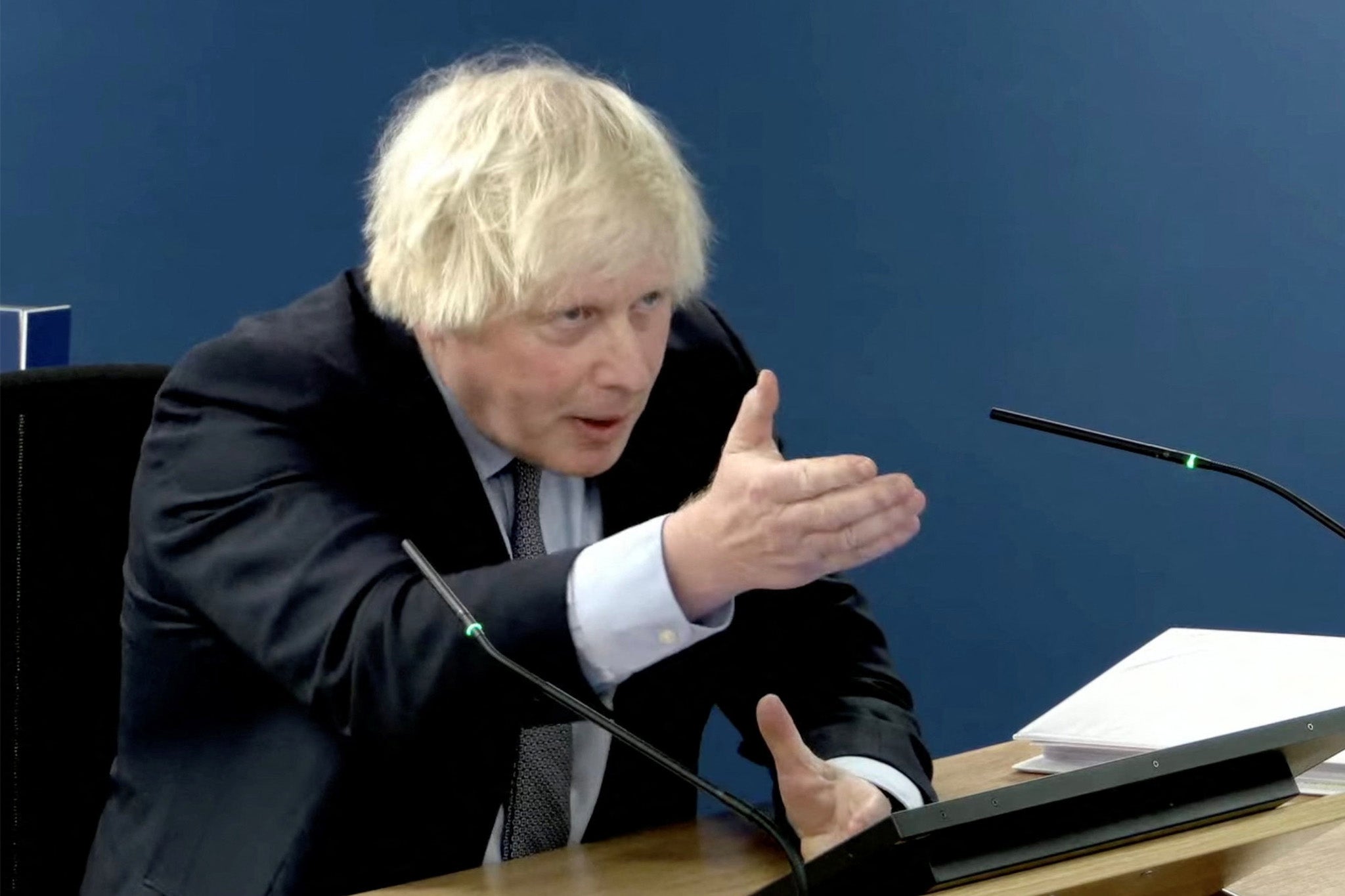Has Boris Johnson paved the way for his second coming? In his dreams…
The former prime minister’s evidence to the Covid inquiry was a reminder that he was a lousy leader of an incompetent government. And he can forget any chance of a political comeback, writes Andrew Grice


Although it was much trailed by his allies, Boris Johnson’s apology for mistakes made in the pandemic turned out to be pretty half-hearted. He didn’t even use the A-word in his opening remarks, saying: “Can I just say how glad I am to be at this inquiry, and how sorry I am for the pain and the loss and the suffering of the Covid victims?”
He went further in his 200-page written statement, which is due to be published on Thursday. “We – I – unquestionably made mistakes, and for those I unreservedly apologise,” he wrote. “There was terrible suffering, which we did our best to alleviate, and, where we failed, I apologise again.”
Yet he appeared to row back in a revealing exchange when Hugo Keith KC, the Covid inquiry’s counsel, asked him to say precisely what he was apologising for. Johnson replied: “We may have made mistakes”, but declined to “itemise them […] in a hierarchy”.
Johnson’s two-day inquisition got off to an inauspicious start when Heather Hallett, the inquiry chair, ticked him off for allowing his allies to brief out his defence before his appearance and the publication of his statement.
Feelings were understandably running high for the victims’ families, who were never going to be won over – even by a grovelling apology. Four people were removed from the hearing after standing up to reveal signs saying: “The dead can’t hear your apologies”. It was a bit of a struggle for the living, too.
His politician’s apology was tactical. The aim was to clear away the undergrowth to create room for him to argue that his government got “the big decisions” right. While it did in some areas, such as the vaccine, it won’t work because we already know from overwhelming evidence to the inquiry that it got several things wrong. Notably, Matt Hancock’s admission that the first lockdown in March 2020 was three weeks too late, and that thousands of lives could have been saved if the government had acted earlier.
Johnson’s tactic will also fail because he cannot rewrite the history of his incompetent, chaotic administration. He was unconvincing when Keith said the explosive WhatsApp exchanges between him and his allies disclosed to the inquiry painted “an appalling picture of incompetence and disarray” and called into question Johnson’s own “competence and performance”.
The former prime minister argued that there is a distinction between “the type of language” used in WhatsApp messages and the “decision-making processes of the government”. In other words, it wasn’t really “government by WhatsApp” – but he is swimming against a huge tide of messages here.
He argued the often incendiary messages were “creatively useful”; it would have been worse if advisers “never expressed an opinion, never challenged and never doubted”. It would not have been right if there were loads of WhatsApps saying, “Aren’t we doing brilliantly, folks, isn’t this going well?” The messages might be selective, but they don’t lie.
Johnson answered his chief adviser Dominic Cummings’s unforgettable description of him as a shopping trolley, veering all over the place by trying to hide behind the scientists. If the government changed course, he said, “so did the collective understanding of the science”. Yet that does not explain all the trolley’s crashes.
Characteristically, he did not offer many concessions, but did admit that “sometimes during the pandemic, too many meetings were too male-dominated”.
It was also in character that Johnson’s performance in today’s opening session did not measure up to the billing from allies, who told us he had been preparing for a year and had pored over a 6,000-word dossier of evidence he might be questioned about.
We do not need the Covid inquiry to tell us what we already know: he was a lousy prime minister who headed an incompetent government. It was no surprise it floundered in the face of an unprecedented challenge that would have severely tested the best-run administration in the world. As Simon Case, the senior Downing Street official during the pandemic and now cabinet secretary, said in a 2020 message: “I’ve never seen a bunch of people less well-equipped to run a country.”
For Johnson, his inquiry appearance is really about trying to limit the damage to a reputation already tarnished by his chaotic premiership and his lies on Partygate. Though he won’t talk about it at the hearing, it is also about preserving the hopes of his dwindling band of acolytes that he can one day make a political comeback.
These allies know the inquiry die is cast; they claim he will become “the chief scapegoat”. Despite that, some are still convinced he can become leader of the opposition after a Tory defeat at next year’s general election, learn from his previous mistakes and have a successful second coming.
It’s a fantasy. Johnson’s underwhelming performance at the inquiry is a reminder of why his fan club will be disappointed. He will never change – and, thankfully, he will never come back.






Join our commenting forum
Join thought-provoking conversations, follow other Independent readers and see their replies
Comments